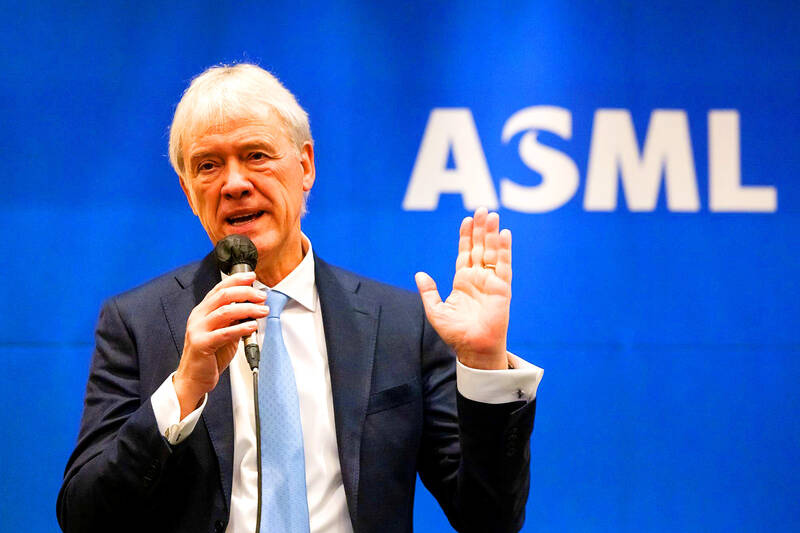Netherlands-based ASML Holding NV, a leading global supplier of semiconductor production equipment, is considering bringing its European suppliers to Taiwan, doubling down on its supply-chain deployment in the country, Vice Premier Shen Jong-chin (沈榮津) said yesterday.
That follows ASML’s announcement that it would build manufacturing facilities in New Taipei City’s Linkou District (林口) to support international customers and the development of the semiconductor industry.
RELOCATION

Photo: Bloomberg
Shen did not disclose details about ASML’s new efforts to relocate European supply chains to Taiwan.
ASML is to begin construction on the New Taipei City project in July, Shen said during a speech at a technology forum on Taiwan’s and Japan’s key semiconductor technology deployment and talent cultivation.
The project would be the Dutch firm’s biggest investment in Taiwan, and the continued cooperation between the company and Taiwan should enhance each other’s semiconductor capabilities.
Taiwan’s semiconductor industry has contributed significantly to the country’s economy, with production hitting NT$4.1 trillion (US$133.8 billion) last year and creating 300,000 jobs, he said.
NO COMMENT
Asked about Shen’s comment on its supply-chain allocation plan, ASML said in a e-mail to the Taipei Times: “We support global semiconductor industry development. We do not comment on specific cases or customers.”
ASML is the world’s sole supplier of extreme ultraviolet lithography (EUV) photolithography machines used by semiconductor manufacturers to produce cutting-edge chips.
It has become one of the foremost wafer-foundry equipment suppliers to Taiwanese manufacturers, including Taiwan Semiconductor Manufacturing Co (台積電), the world’s largest contract chipmaker.
ASML has five factories in Taiwan employing more than 4,500 people and plans to increase its investments in the country.
The company in 2020 launched a global EUV training center for engineers at the Southern Taiwan Science Park (南部科學園區) in Tainan.

To many, Tatu City on the outskirts of Nairobi looks like a success. The first city entirely built by a private company to be operational in east Africa, with about 25,000 people living and working there, it accounts for about two-thirds of all foreign investment in Kenya. Its low-tax status has attracted more than 100 businesses including Heineken, coffee brand Dormans, and the biggest call-center and cold-chain transport firms in the region. However, to some local politicians, Tatu City has looked more like a target for extortion. A parade of governors have demanded land worth millions of dollars in exchange

An Indonesian animated movie is smashing regional box office records and could be set for wider success as it prepares to open beyond the Southeast Asian archipelago’s silver screens. Jumbo — a film based on the adventures of main character, Don, a large orphaned Indonesian boy facing bullying at school — last month became the highest-grossing Southeast Asian animated film, raking in more than US$8 million. Released at the end of March to coincide with the Eid holidays after the Islamic fasting month of Ramadan, the movie has hit 8 million ticket sales, the third-highest in Indonesian cinema history, Film

Taiwan Semiconductor Manufacturing Co’s (TSMC, 台積電) revenue jumped 48 percent last month, underscoring how electronics firms scrambled to acquire essential components before global tariffs took effect. The main chipmaker for Apple Inc and Nvidia Corp reported monthly sales of NT$349.6 billion (US$11.6 billion). That compares with the average analysts’ estimate for a 38 percent rise in second-quarter revenue. US President Donald Trump’s trade war is prompting economists to retool GDP forecasts worldwide, casting doubt over the outlook for everything from iPhone demand to computing and datacenter construction. However, TSMC — a barometer for global tech spending given its central role in the

Alchip Technologies Ltd (世芯), an application-specific integrated circuit (ASIC) designer specializing in server chips, expects revenue to decline this year due to sagging demand for 5-nanometer artificial intelligence (AI) chips from a North America-based major customer, a company executive said yesterday. That would be the first contraction in revenue for Alchip as it has been enjoying strong revenue growth over the past few years, benefiting from cloud-service providers’ moves to reduce dependence on Nvidia Corp’s expensive AI chips by building their own AI accelerator by outsourcing chip design. The 5-nanometer chip was supposed to be a new growth engine as the lifecycle